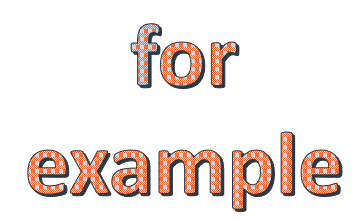The two most powerful words in nonfiction writing: “for example”

Nonfiction writing is filled with generalizations and blanket advice. It’s inevitable: if you are drawing big conclusions, you’re going to make broadly applicable statements.
To ground those conclusion, you must be specific. And the easiest way to do that is with an example.
My first book (65,000 words) included 104 instances of “for example.” My most recent book had (55,000 words) had 47. And my next book will have 64.
You might think you need to vary a phrase that frequent, but like “said,” it’s one of those phrases that doesn’t seem repetitive. People just read it and then wait eagerly for the specifics.
Some examples of “for example.”
Here are a few, ahem, examples from my upcoming book, which is a guide for authors:
- The idea should be new, because why write a book about an idea everyone already knows about? For example, Talk Triggers wasn’t the first book on word of mouth, but it’s arguably the first one that shows systematically how to engineer your business to create it.
- Quality hybrid publishers are not all the same. For example, Rohit Bhargava, the publisher of Ideapress Publishing and himself an author of eight books, takes a personal interest in and works one-on-one with his authors as a peer — including developmental editing when it’s needed.
- You want to be sure the internal layout looks professional — avoid margins that are too small or too large, type that’s out of proportion, or blocks of text in a sans-serif font, for example.
- The simplest way to gather primary research is to interview people with something relevant to say about your topic. Those interviews should include people who’ve done what you’re writing about (fended off a cyberattack, run an accounting department, written code in Python, or innovated at a start-up company, for example).
- Next divide up the tasks in the project — writing, research, data analysis, whatever. For example: You’ll write chapters 1-7 and I’ll edit, and I’ll write chapters 8-11 and you’ll edit. Or, you’ll do all the research, and I’ll do all the writing.
Could you figure out what a new idea is, how hybrid publishers differ, what makes a book look unprofessional, what kind of people to interview, or how to divide up tasks without these examples? Sure, but you’d wonder if you were getting it right.
Real arguments use examples
Examples are easier to gather than statistics, more convincing than extended abstract justifications, and more vividly believable than impassioned pleas that you’re right. They’re frankly too convincing — often things are more complex than one example than convey — but even so, they’re an essential tool in nonfiction writing.
In my editorial reviews, I sometimes ask authors “can you cite an example?” This annoys them, since they want to just state their generalizations and move on.
But if you write a generalization or general piece of advice and you can’t think of an example, your reasoning is suspect. Why should we believe you?
Show me your examples and I’ll believe you. Leave them out and you might just seem like a blowhard and a pretender. It’s your choice.
Goes right into today’s class lecture.
100%.
I counted 19 instances in my forthcoming book. I also use:
* Exhibit A
* Case in point
* For instance
Regardless of the exact words, I’m with you on showing, not telling. Not including examples should make the author uncomfortable. I know of one prominent business writer who relies exclusively on generalities. I stopped reading their books because it annoyed me so much.
Thoughtful technical writers use “for example” often. In a 280-page user guide that I wrote for mine inspectors, I used the phrase 44 times. For example:
“Capitalize exactly how you want your name to be printed—for example, Jean or JEAN.”